
Israeli plot against Iran-US talks
By Abdolreza Farajirad
International affairs expert
The recent removal of Robert Malley from his position as the US special representative in Iran affairs has prompted a range of analyses and discussions. This decision garnered significant attention due to reports of talks between Iran and the United States taking place in Oman, Qatar, and even New York, leading to the development of a potential framework for a temporary or short-term deal.
Over the past two years, Iran’s negotiations with the United States regarding the revival of the 2015 nuclear agreement (JCPOA) or the lifting of sanctions have unfolded in three distinct stages. The first stage occurred during the final months of Iran’s previous government and the initial months of successor, with chief negotiator Abbas Araqchi at the helm.
The second stage, which took place last year, was led by Ali Baqeri Kani, the deputy foreign minister for political affairs, and involved discussions with Western parties to the JCPOA, culminating in reaching the threshold of signing an agreement. However, due to the outbreak of the Ukrainian war, the agreement was not finalized.
The third stage encompassed recent dialogue between the Iranian side and the United States in Oman, Qatar, and New York. As per media reports, during this phase, the two parties had come to a conclusion to sign a political understanding, rather than a long-term agreement, which also included prisoner exchange. However, it appears that these negotiations have encountered opposition and faced obstacles at this particular stage.
From my perspective, each of the three negotiation stages, which were on the brink of reaching an agreement, ultimately failed due to an external conspiracy. The responsibility for leading this opposition movement also falls on the Israelis. The Russians might had also come to assist the Israelis in disrupting the talks between Iran and the United States.
Recent media reports stated that Israel intended to provide its anti-aircraft system, known as the Iron Dome, to Ukraine. However, following discussions between Israeli and Russian officials, the transfer of the Iron Dome to Ukraine was canceled. Additionally, the delivery of Russian Su-35 fighter jets, which were supposed to be provided to Iran by the Russians despite Israeli objections, has not yet taken place.
Simultaneously, opponents of the Islamic Republic of Iran based overseas exerted considerable pressure on Malley, questioning his motives for engaging in negotiations with Iranian representatives and attempting to reach an agreement.
There appears to be a foreign conspiracy orchestrated by those who do not wish to see a reduction in tensions between Iran and America, aiming to prevent the negotiations from reaching a conclusive outcome.
It is important to note that managing or reducing tensions is distinct from establishing a full-fledged relationship between the two countries. The current focus lies in the management and control of tensions to prevent their further escalation.
The political understanding sought by Malley was meant to serve this purpose, and it had the potential to lay the groundwork for negotiations for a lasting agreement following the US presidential election, particularly if the Democrats were to emerge victorious once again.
Nevertheless, Malley has faced domestic pressure, potentially due to his actions, including consultations held with Iranian expatriates, which may be deemed as a violation of American domestic law. His case is currently under investigation.
However, there is still optimism as his deputy, Abram Paley, has assumed Mali’s position, and the United States has affirmed its intention to resume working with Iran in a similar fashion as before.
I remain hopeful that talks between Iran and America, whether conducted in Oman, Qatar, New York, or elsewhere, will recommence soon and reach a conclusion within the next month or two. Prolonging the negotiations until the eve of the US presidential election presents challenges due to increased pressure and tensions from the opposition and Republicans.







